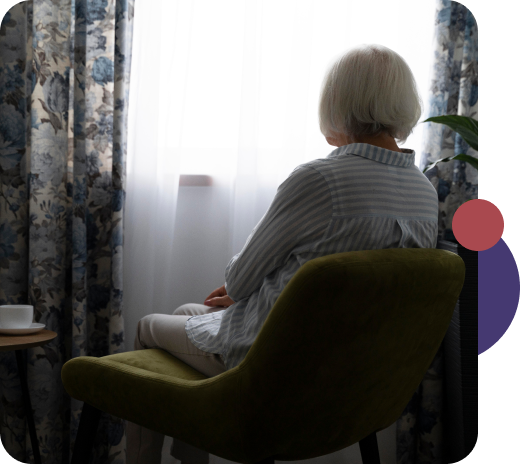Alleviating loneliness in Retirement homes
A Generative AI assisted platform helping residents build meaningful, safe and inclusive connections
improve social connections
identify and track cognitive disorders

Problem
Loneliness has severe consequences, especially among older adults. Studies have linked loneliness to increased risk of depression, cognitive decline, and physical health problems. As older adults may feel disconnected from others and less engaged with the world around them, loneliness can lead to a reduced quality of life and an increased mortality risk.



Our Solution
The AssistedShare platform works with retirement communities to improve social connections using generative AI assisted video calls, and incorporates technology to help detect and track certain cognitive disorders
A Media rich
platform to improve
social connections
Peer To Peer call...No mobile apps
Retirement facilities can set a schedule for round-robin video chats for their residents. Every resident gets an opportunity to meet every other resident in a meaningful way simply by responding to a text message.
Display media using voice
During video chats, each resident can show previously uploaded media using voice command. Sharing life stories will never be easier.


Respond to text message

Get
paired

Share
stories





our Platform Incorporates Speech Analytics to Help identify and track cognitive disorders

Early detection
Can detect subtle changes in speech patterns to indicate the early onset of a cognitive disorder such as dementia

Non-invasive
Residents do not need to undergo any physical examination or testing

Continuous monitoring
Can also be used for continuous monitoring of residents' cognitive abilities


It's inclusive, cutting edge, and Safe
AssistedShare platform is HIPAA compliant, and utilizes AI based safety features.

Inclusive

Cutting Edge

Safe



Safety features
The generative AI chatbot will intervene if it detects abusive language or request for personal information

HIPAA compliant solution
Conversations are never recorded. The platform leverages AWS security services to run a HIPAA compliant solution
Frequently asked questions
Yes, according to research published by the National Library of Medicine (NCBI), speech analysis is a promising tool for diagnosing mild cognitive impairment and Alzheimer’s disease. The reported features seem to be indicators of the cognitive changes in older people. The research confirms that the analysis of speech signal among people with Alzheimer’s disease and mild cognitive impairment is a useful tool for detecting subtle changes in their language. There are indeed rhythmic and acoustic features that characterize the voices of these patients and can be used with great success to diagnose their condition. It constitutes an efficient, cheap, and easy-to-use tool that may facilitate the screening of dementias.
According to a report on healthy aging from the Centers for Disease Control and Prevention (CDC), more than one-third of adults aged 45 and older feel lonely, and nearly one-fourth of adults aged 65 and older are considered to be socially isolated.
Loneliness and social isolation in older adults are serious public health risks. According to the Centers for Disease Control and Prevention (CDC), recent studies found that:
- Social isolation significantly increased a person’s risk of premature death from all causes, a risk that may rival those of smoking, obesity, and physical inactivity.
- Social isolation was associated with about a 50% increased risk of dementia.
- Poor social relationships (characterized by social isolation or loneliness) was associated with a 29% increased risk of heart disease and a 32% increased risk of stroke.
- Loneliness was associated with higher rates of depression, anxiety, and suicide.
- Loneliness among heart failure patients was associated with a nearly 4 times increased risk of death, 68% increased risk of hospitalization, and 57% increased risk of emergency department visits.